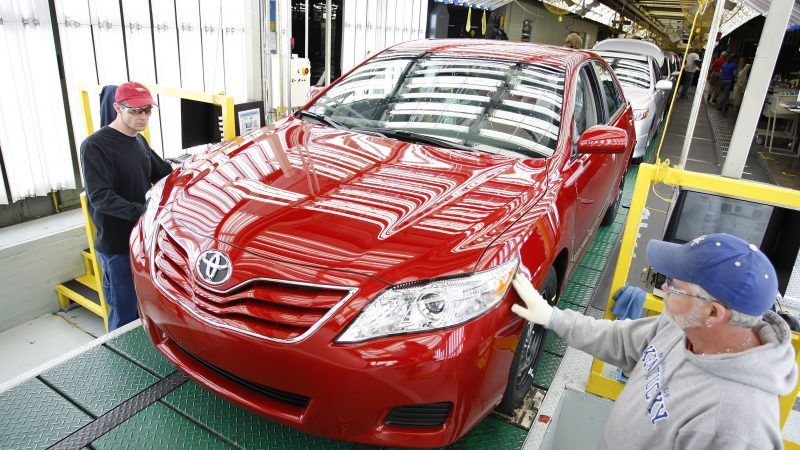The brand new Camrys rolling off the assembly line at the world's largest Toyota plant in Georgetown, Kentucky, might be a threat to American national security—but apparently the threat is not serious enough to justify immediate action.
That's the message the White House delivered on Friday morning when it announced that President Donald Trump would wait another six months before imposing threatened tariffs on imported cars and car parts. At the same time, the White House also released a report detailing the legal rationale for raising those tariffs, should the president decide to do so.
After a months-long review of automotive imports into the United States, Commerce Secretary Wilbur Ross "concluded that the present quantities and circumstances of automobile and certain automobile parts imports threaten to impair the national security," the White House said in a statement.
Under Section 232 of the Trade Expansion Act of 1962, a president can unilaterally impose tariffs for national security reasons. Unfortunately, the law is vague and unspecific about what exactly counts as a "national security" reason—a huge loophole that Trump exploited last year to impose 25 percent tariffs on steel imports and 10 percent tariffs on aluminum imports under similarly vacuous claims. Congress has been unwilling to rein in the president's authority to use Section 232 to impose tariffs, and a lawsuit challenging the constitutionality of those broad and unaccountable presidential powers has also come to naught.
That means it's probably lawful for Trump to slap imported cars with tariffs, even if it is beyond laughable to claim that a BMW assembled in South Carolina with German-made parts is somehow threatening American national security. And if they really did post a threat to national security, why would the White House wait six months to address it? The answer, of course, is that the administration hopes to use these tariff threats as negotiating tactic—something that seems to fall well outside the scope of what Section 232 allows.
Strip away the sheen of nationalism and the nonsensical "national security" rhetoric, and it's easier to see these threatened tariffs for what they really are: a massive, cronyist giveaway to Ford, GM, and other American-owned car companies at the expense of foreign-owned companies that have invested in the United States and its workforce.
Indeed, the report released by the White House on Friday goes to great lengths to differentiate between "American-owned" car companies and "foreign-owned" car companies.
"Increases in imports of automobiles and automobile parts, combined with other circumstances, have over the past three decades given foreign-owned producers a competitive advantage over American-owned producers," the report claims. In another section, the White House points to the fact that American-owned car companies now have a smaller share of the domestic auto market than previously.
"In light of all these factors, domestic conditions of competition must be improved by reducing imports," the White House's report concludes.
That line really gives away the game. This isn't about national security at all—it's about protecting some businesses at the expense of others.
If all Toyotas were built in Japan and all BMWs were built in Germany, that might make some sense—at least in terms of protecting American jobs, which is what Trump claims his tariffs are all about. But the car manufacturing industry has done exactly what Trump says he wants other industries to do: build their products here. The world's largest Toyota plant is in Kentucky. The world's largest BMW plant is in Spartanburg, South Carolina. Those "foreign-owned companies" aren't stealing American jobs—they are creating them.
Which means that a tariff on imported cars and car parts would destroy American jobs.
The Center for Automotive Research projects that a 25 percent tax on imported cars and car parts would cost nearly 367,000 jobs and reduce America's gross domestic product by more than $30 billion. Downstream businesses stand to lose, too. Car dealers could lose $43 billion in revenue and 77,000 jobs as prices for new cars jump by an estimated $2,700 and sales fall by about 1.3 million units, according to the center's projections.
A 25 percent tariff on imported cars and car parts would increase the cost of cars sold in the United States by $2,000 to $7,000 each, according to the Alliance of Automobile Manufacturers. Even American-made cars would be affected since there literally is no such thing as a fully American-made car anymore and automobile manufacturers have supply chains that wrap around the world. Those global supply chains have helped trigger a boom in American automaking, which now employs more than 8 million workers—a 50 percent increase since 2011, according to the American Automotive Policy Council.
Trump isn't imposing those tariffs yet, it's true. But the nonsensical rationalization about national security and the blatant cronyism evident in the White House's announcement on Friday provides a window into the president's warped understanding of global trade.
After Friday's announcement, the president should face a simple question. Why does he believe the federal government should prioritize jobs at a Ford plant in Tennessee ahead of a BMW plant in South Carolina or a Toyota plant in Kentucky?
It shouldn't, of course, but that's where Trump's supposedly "America First" economics are leading.

